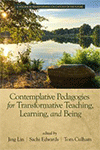
Contemplative Pedagogies for Transformative Teaching, Learning, and Being
Edited by:
Jing Lin, University of Maryland
Tom E. Culham, City University in Canada and Simon Fraser University
Sachi Edwards, University of Tokyo
A volume in the series: Transforming Education for the Future. Editor(s): Jing Lin, University of Maryland. Rebecca L. Oxford, University of Maryland. Vachel W. Miller, Appalachian State University. Amanda Jane Fiore, State Department.
Published 2019
In our current systems of education, there is a trend toward compartmentalizing knowledge, standardizing assessments of learning, and focusing primarily on quantifiable and positivist forms of inquiry. Contemplative inquiry, on the other hand, takes us on a transformative pathway toward wisdom, morality, integrity, equanimity, and joy (Zajonc, 2009). These holistic learning practices are needed as a counterbalance to the over-emphasis on positivism that we see today. In addition to learning quantifiable information, we also need to learn to be calmer, wiser, kinder, and happier. This book aims to find and share various pathways leading to these ends.
This book will describe educational endeavors in various settings that use contemplative pedagogies to enable students to achieve deep learning, peace, tranquility, equanimity, and wisdom to gain new understanding about self and life, and to grow holistically.
Embodiment is a central concept in this book. We hope to highlight strategies for exploring internal wisdoms through engaging ourselves beyond simply the rational mind. Contemplative pedagogies such as meditation, yoga, tai chi, dance, arts, poetry, reflective writing and movements, can help students embody what they learn by integrating their body, heart, mind, and spirit.
CONTENTS
Introduction: Contemplative Pedagogies for Profound Transformation in Teaching, Learning, and Being, Jing Lin, Tom Culham, and Sachi Edwards. SECTION I: MEDITATION: WHY AND HOW CAN IT POWERFULLY TRANSFORM US? Connecting Meditation, Quantum Physics, and Consciousness: Implication for Higher Education, Jing Lin and Roshan Parikh. Mindfulness, Meditation, and the Cultivation of Empathy: Contemplation From a 10-Day Meditation Retreat, Ayush C. Pokharel. SECTION II: PROGRAMS TRANSFORMING STUDENTS THROUGH CONTEMPLATIVE CURRICULA. Pedagogical Infusion of the Contemplative: Simon Fraser University’s Contemplative Inquiry Master’s of Education Program in Canada, Laurie Anderson, Muga Miyakawa, Meena Mangat, Charles Scott, and Heesoon Bai. Nourishing the Inner Life of the Educator, Robert London. SECTION III: MINDFULNESS FOR TEACHER EDUCATION AND TEACHER PROFESSIONAL DEVELOPMENT. From the Instrumental to the Existential: An Experiential Approach to Teaching Mindfulness, Hongyu Wang. Expanding the Ripples of Peace and Thinking of New Metaphors: Employing Transformational Peace Language Activities in Teacher Education and the Schools, Rebecca L. Oxford and M. Matilde Olivero. Teaching Compassionately: Teacher Professional Development and Impact, Molly S. Dunn. SECTION IV: MOVEMENTS AS MEDITATION: AIKIDO AND TAI CHI, AND LABYRINTH WALKING. Tai Chi as a Contemplative Practice and Its Impacts in Higher Education, Fan Yang and Jing Lin. Contemplative Practices: Introducing Tai Chi as a Mindfulness Exercise in School Curriculums, Julie Keddell. The Labyrinth as Contemplative Pedagogy in Higher Education, Natalie Vinski Ibrahim. The Way of the Classroom: Aikido as Transformative, Embodied Pedagogy for Self Cultivation, Michael Gordon. SECTION V: WORKING WITH YOUNG CHILDREN AND ADOLESCENTS, AND CHILDREN ON THE STREETS. Building a Mindful Classroom: The Quaker School Experiences, Yuyun Peng. Cultivating “Response-Ability” Through Contemplative Practices: Philosophical Underpinnings and Pedagogical Applications in a Hong Kong High School, Weili Zhao and Marty Schmidt. Street Family: A Global Look at Programs for Street Children and Contemplative Approaches for Restorative Justice, Cameron Busacca. SECTION VI: CULTIVATING LOVE AND VIRTUE ETHICS. Application of Meditation in Business Ethics Education: An Action Research, Tom Culham and Neha Shivhare. Cultivating a Heart Space: The Role of Eros in Facilitating Campus Group Meditation, Keith Brown and John P. Miller. SECTION VII: LEARNING AND TEACHING CONTEMPLATIVELY, REFLECTIVELY, AND RELATIONALLY. The Classroom as an Interconnected, Living Space: Integrating Reflective, Contemplative Practice Into General Education, Amanda Fiore. Reflective Journaling as Contemplative Practice: Applications for a Social Justice Educator, Sachi Edwards. Using Contemplative Practice to Build and Explore Connections to Nature: A Case Study, Jennifer Byrne. About the Contributors.
-
Paperback9781641137805
Web price: $45.04 (Reg. 52.99)
-
Hardcover9781641137812
Web price: $80.74 (Reg. 94.99)
- eBook9781641137829

- EDU009000 - EDUCATION: Educational Psychology
- EDU046000 - EDUCATION: Professional Development
- EDU012000 - EDUCATION: Experimental Methods
-
 Apocalyptic Leadership in Education
Facing an Unsustainable World from Where We Stand
Apocalyptic Leadership in Education
Facing an Unsustainable World from Where We Stand
-
 Critical Conversations about Religion
Promises and Pitfalls of a Social Justice Approach to Interfaith Dialogue
Critical Conversations about Religion
Promises and Pitfalls of a Social Justice Approach to Interfaith Dialogue
-
 Fallow Lands of Plenty
Public Schools as Leaders in Rural Food System Relocalization
Fallow Lands of Plenty
Public Schools as Leaders in Rural Food System Relocalization
-
 Hope for the Embattled Language Classroom
Pedagogies for Well-Being and Trauma Healing
Hope for the Embattled Language Classroom
Pedagogies for Well-Being and Trauma Healing
-
 Re-Envisioning Higher Education
Embodied Pathways to Wisdom and Social Transformation
Re-Envisioning Higher Education
Embodied Pathways to Wisdom and Social Transformation
-
 The Wisdom Way of Teaching
Educating for Social Conscience and Inner Awakening in the High School Classroom
The Wisdom Way of Teaching
Educating for Social Conscience and Inner Awakening in the High School Classroom
-
 Toward a Spiritual Research Paradigm
Exploring New Ways of Knowing, Researching and Being
Toward a Spiritual Research Paradigm
Exploring New Ways of Knowing, Researching and Being

